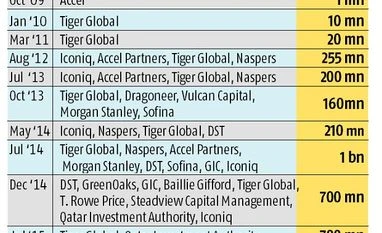SoftBank Vision Fund, the $100-billion fund floated by SoftBank chief Masayoshi Son to invest in technology companies, is in talks with India’s largest e-commerce marketplace, Flipkart, to invest $2 billion.
Discussions between the two firms kicked off as soon as the deal to merge SoftBank-backed Snapdeal with Flipkart fell through on Monday. Softbank’s offer to Flipkart is very similar to what was on the table but without Snapdeal, according to sources.
About half, or $1 billion, of the SoftBank investment will go to investor Tiger Global, which has been looking for a partial exit from Flipkart for more than 18 months.
The remaining amount will help build a $2.5-billion war chest that the Indian firm is putting together to fend off attacks from Amazon. SoftBank, which orchestrated the failed merger of the two Indian e-commerce companies, has written off its $900-million investment in Snapdeal.
The deal was largely being seen as a way to acquire a small stake in Flipkart, while also eliminating any competition that might hurt the company in its fight with Amazon. While SoftBank allowed Snapdeal to pursue its independent strategy — mirroring China’s Taobao, which is owned by Alibaba — the Japanese investor, in a statement on Monday, maintained that it would continue to remain “invested in the vibrant Indian e-commerce space”.
Flipkart declined comment. A SoftBank spokesperson said: “The SoftBank Vision Fund follows an independent process and reviews every investment on its own merit.”
More From This Section
With the $100-billion vision fund, SoftBank will invest with a clean slate to make a double-digit stake purchase in Flipkart, making it one of the largest backers of the Indian firm.
However, even with this investment, it is unlikely that SoftBank will be the largest voice in Flipkart’s boardroom. In a funding round in April, Flipkart raised $1.4 billion at a valuation of $11.6 billion, half of the money being pumped in by Chinese Internet giant Tencent.
Naspers, one of the largest shareholders in Tencent, is also among the largest backers of Flipkart. The two companies together hold a significant stake, rivalled only by Tiger Global at the moment. But with Tiger opting for a partial sell-out, the power of the Tencent-Naspers duo on the board of Flipkart could become more significant.
While an infusion of cash will undoubtedly help Flipkart in its battle with Amazon, a reduction of Tiger Global’s stake could have an adverse impact on the company. Former Tiger executive Kalyan Krishnamurthy is chief executive officer (CEO) of the company, after the board shifted the two founders — Sachin Bansal and Binny Bansal — to non-operational roles.
Krishnamurthy is credited with turning around Flipkart in an extremely short period of time, helping it stay ahead of Amazon. His hands-on approach to running the business, with a large focus on sales rather than just technological innovation, though controversial, is seen to be working wonders for the firm.
With Tiger’s reduced interest in Flipkart, Krishnamurthy’s position as CEO could become tenuous. There’s also a possibility for the return of one of the Flipkart founders in the key position, as they find favour with SoftBank, Tencent, eBay, and some of the company’s existing investors.
Sources: Flipkart, BS Research
)